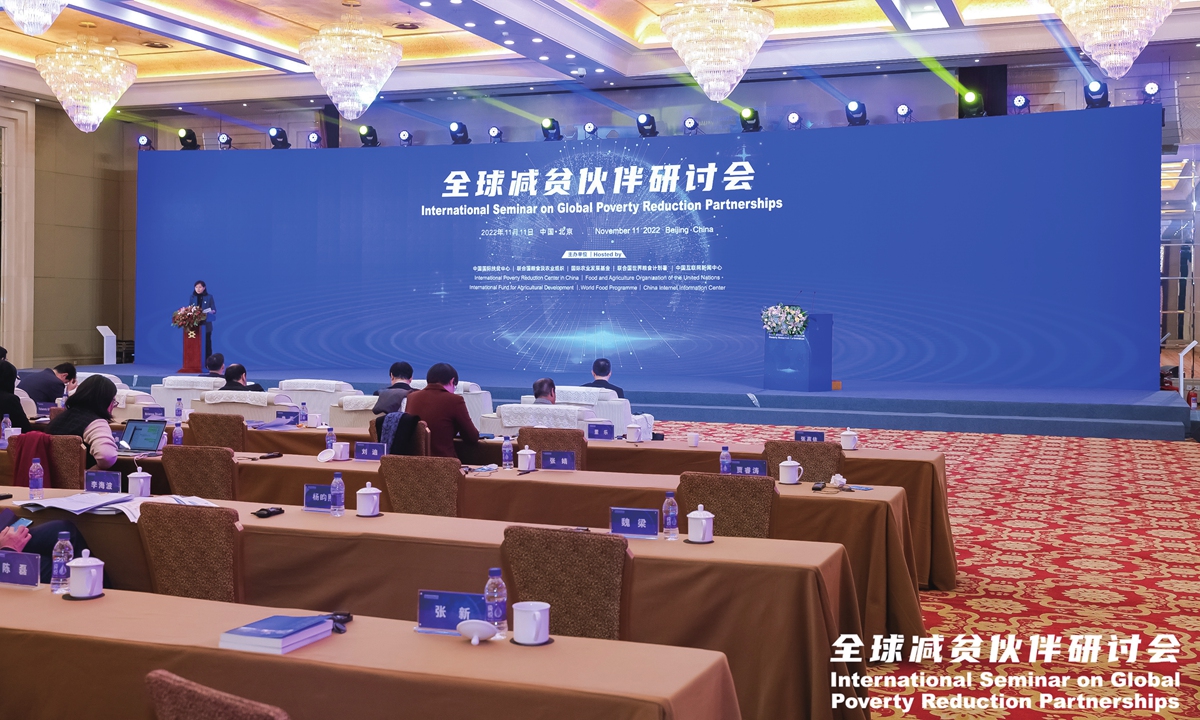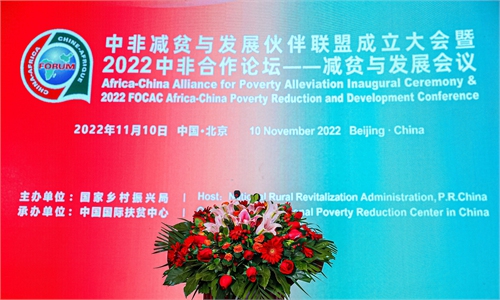Partnerships under the community of shared future crucial to sustainable development of global poverty reduction

The 2022 International Seminar on Global Poverty Reduction Partnerships Photo: Courtesy of the International Poverty Reduction Center in China
The 2022 International Seminar on Global Poverty Reduction Partnerships was held in Beijing on November 11, using a mix of online and offline formats, and under the theme of "Shared Development-Poverty Reduction and Sustainable Rural Revitalization." There were about 120 participants from government departments, United Nations agencies and international organizations, diplomatic missions, NGOs, academia and the private sector."The seminar aims to promote the establishment of poverty reduction partnerships, exchange of national experiences in poverty reduction, strengthen knowledge sharing and promote the implementation of the 2030 Agenda for Sustainable Development," said Xia Gengsheng, vice administrator of the National Rural Revitalization Administration of China.
Xia noted that the global poverty reduction process faces great challenges. Some countries are making slow progress or oven regressing on sustainable development issues, and "we should deepen partnerships and strengthen practical cooperation."
Janesh Kain, deputy secretary general of the Shanghai Cooperation Organization (SCO) Secretariat agreed with that the partnership is very important for promoting sustainable development cooperation framework, and the SCO wants to regard China as an international development partner to leverage China's contribution as a provider of South-South cooperation and financing, so it has to accelerate the achievement of the Sustainable Development Goals to ensure that no one is left behind.
COVID-19 is a huge challenge for poverty reduction, especially for poverty elimination, and in this case, China is a good example to share its poverty reduction experiences. Through unremitting efforts, China completed the arduous task of eliminating absolute poverty in 2020 and achieved the poverty reduction target of the United Nations 2030 Agenda for Sustainable Development 10 years ahead of schedule, which is a very significant achievement.
There are four kinds of experiences to get rid of poverty, said Gao Boyang, a professor at the Central University of Finance and Economics: first, coordinating the epidemic prevention and control and poverty issues; second, increasing financial support; third, establishing a mechanism to monitor and help prevent return to poverty; fourth, increasing employment assistance, and to increasing industrial assistance.
"According to recent projections, there are still 685 million people living in extreme poverty and 650 million people still facing hunger, so increasing food security is also very important for poverty reduction," said Wang Wei, special advisor to president of IFAD.
The focus has to be on sustainable development, and long-term resilience, especially of the most vulnerable people and systems.
So an enabling policy environment that includes women, children, and making food and ration systems and supply chains more resilient will allow us to better reduce these food insecurity and crisis situations in the coming years.
The IFAD has been working to address the root causes of rural poverty to achieve the goals of sustainable development, the organization recently did an impact assessment that concluded from 2019 to 2021, the IFAD investments improved the standard of living for 77 million people.
At the same time, their productivity is rising, and 64 million farmers are able to gain better access to markets. So now it clearly shows that the investment in agricultural technology to empower rural populations with information can make a very big difference in helping them escape poverty and build long-term resilience, she noted.
Besides, SSTC can also serve as a catalyst to advance cooperation with the private sector to share resources and ensure that its cooperation in the global South achieves scale.
IFAD continues to work with a wide range of development partners to enhance capacity building in developing countries, and advance inclusive and sustainable development, Wang said.
"SSTC has enormous potential for agriculture and rural development in developing countries. It not only facilitates the sharing of financial resources among Southern countries, but also unlocks diverse experiences and provides relevant, targeted and cost-effective solutions to pressing development challenges. Since the establishment of the China-IFAD SSTC Facility in 2018, 17 projects have been approved under the Facility, covering a broad range of thematic areas, such as value chain upgrade, climate resilience enhancement, and rural youth employment.," Zhang Xiaozhe, the regional SSTC manager of IFAD, told the Global Times.

